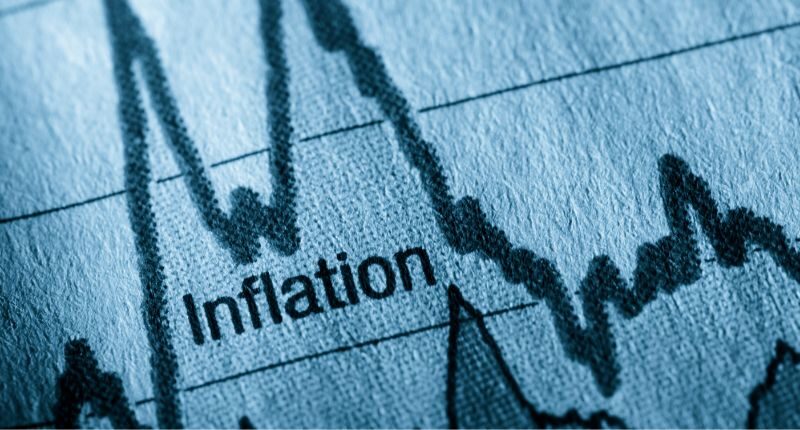
- The latest is down from January's 7.4%
- Inflation peaked in December last year at 8.4%
- Main drivers this month include housing and food
This morning, the Australian Bureau of Statistics (ABS) released the latest monthly Consumer Price Index (CPI) indicator. Rising 6.8% in the year to February 2023, this shows a slowing in Australia’s inflation.
Michelle Marquardt, ABS head of prices statistics, said: “This month’s annual increase of 6.8 per cent is lower than the 7.4 per cent annual rise reported in January 2023. This marks the second consecutive month of lower annual inflation, also known as ‘disinflation’, from the peak of 8.4 per cent in December 2022.”
All groups month CPI indicator, Australia, annual movement (%)

Housing continues to drive inflation
The latest inflation figures showed housing (+9.9%) to be the most significant contributor to the annual increase seen in February, followed by food and non-alcoholic beverages (+8.0%), transport (+5.6%) and recreation and culture (+6.4%).
Drivers of the CPI haven’t varied much from January’s monthly CPI indicators, with the ABS then noting the most significant contributors were housing (+9.8%), food and non-alcoholic beverages (+8.2%) and recreation and culture (+10.2%).
Ms Marquardt said, “The annual increase for the Housing group in January (+9.8 per cent) was lower than December (+10.1 per cent). The key contributors to this change were New dwellings and Rents. In monthly terms, both New dwelling (+0.5 per cent) and Rents (+0.7 per cent) prices rose. However, Rents are growing more strongly than they were 12 months ago while the increases in New dwelling prices are moderating compared to a year ago.”
Prices for Food and non-alcoholic beverages rose 8.2 per cent annually, lower than the 9.5 per cent annual increase in December. Ms Marquardt said “On a monthly basis most Food and non-alcoholic beverages prices rose. The main exception was Fruit and vegetables which fell in price (-2.3 per cent).”
Travel remains a strong desire for Australians, with the ABS figures showing recreation and cultural group remain elevated: “This was primarily due to holiday travel and accommodation rising 17.8 per cent for the year to January, down from 29.3 per cent for the year to December.”
Ms Marquardt noted, “Airfares and holiday accommodation prices tend to be quite variable, and this month is no exception. On a monthly basis, holiday travel and accommodation prices fell 7.2 per cent in January following a rise of 29.3 per cent in December.”
Last year, during the December quarter, the drivers were different, with domestic and international travel making up the top two contributors, followed by electricity and then new homes.
To note: The above paragraph refers to the December quarter, whereas the latest CPI figures relate to monthly data.
Industry reacts
Chief customer officer of Frollo, an open banking platform, Simon Docherty, said: “The drop in inflation is a strong and positive sign that the RBA’s monetary policy measures are starting to take effect. This is welcome news for Australian consumers who have been struggling with the rising cost of living over the past year.”
Docherty also raised concerns over the potential flow-on effects of an economic slow-down:
“Data from our budgeting app shows that consumers have been allocating an increasing portion of their income towards essential expenses like groceries, healthcare, and insurance. Many have also turned to unregulated credit sources such as Buy Now Pay Later providers, with the average BNPL user spending over $400 per month on repayments.
“As a result, it was only a matter of time before consumers began to reduce their spending and tighten their budgets. However, policymakers must balance the need to slow down the economy with the potential impact on consumers and small businesses. It’s important to ensure that the economic slowdown doesn’t have a severe knock-on effect on everyday Australians.”
Master Builders Australia CEO Denita Wawn said: “While this is a welcome sign that the inflation figures look to have peaked, the rate of decline is happening far too slowly.”
“Over the year to February, the cost of new dwelling purchases was still up by 13 per cent and serves as a reminder of how tackling home building cost pressures more aggressively could contribute to lowering inflation across the economy.”
Wawn highlighted the impact that inflation has on construction, in particular, “… because of the higher capital requirements for the work we do and how closely construction activity is tied to private sector investment decisions.”
“The cost of housing is not determined in isolation and is heavily influenced by the delivery of critical infrastructure and key non-residential building activity which enables it.”
Calls continued to increase housing supply, with Wawn noting that, “Unlike most cost items, rental prices have failed to decelerate during February and are now 4.8 per cent higher than a year ago.”
“While monetary policy using interest rate rises is starting to show fruits with consumer spending power, the most sustainable solution to the inflationary problem lies on the supply side, by bringing down the cost of doing business.
“This requires issues like labour shortages, materials costs, and the regulatory burden to be dealt with in a focused and urgent manner.
“We need to speed up the rollout of new housing stock on the medium and high-density side of the market to help bring rental inflation down. Housing affordability in the rental market is a growing source of stress for many households.”







